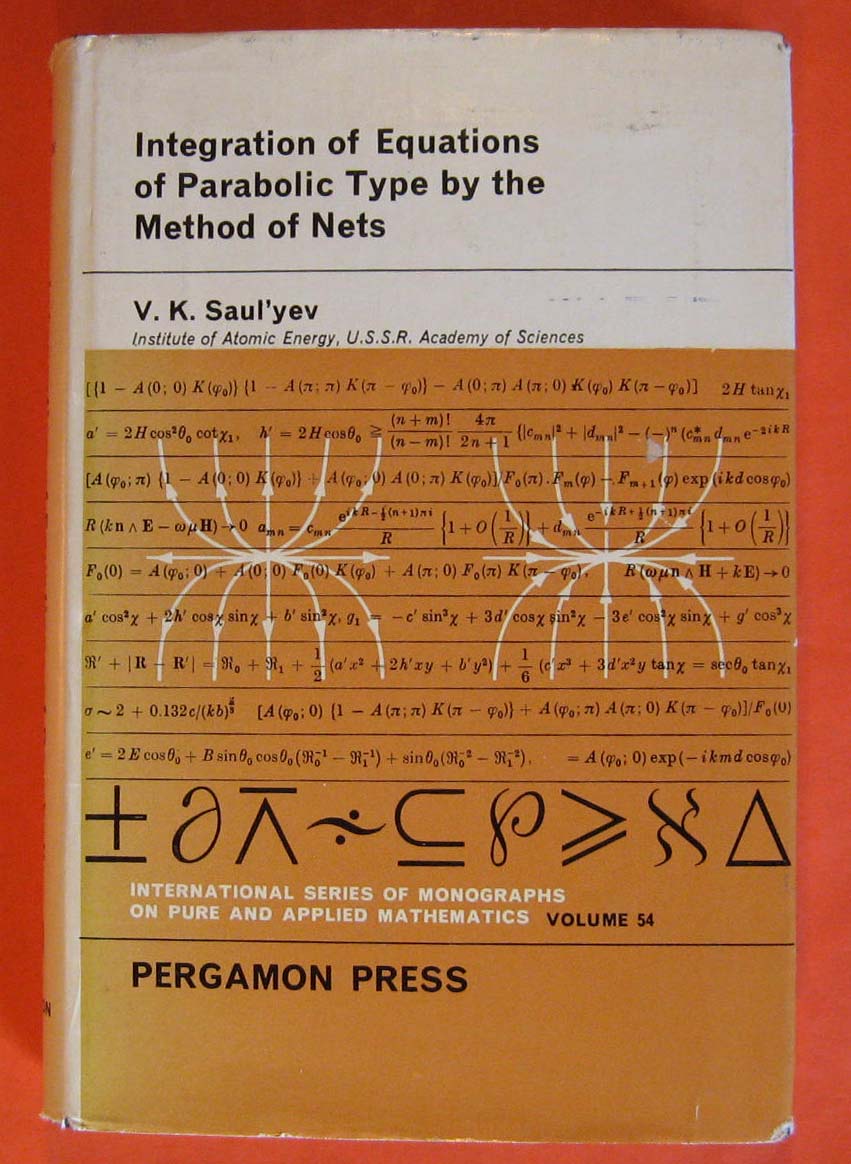You're welcome. BTW I see that Jim Douglas Jr. passed few years ago.
https://sinews.siam.org/Details-Page/Ob ... Douglas-Jr
Peter Lax is still here.
Re: Are Artificial Intelligence methods (AKA Neural Networks) for PDEs about to rediscover the wheel ?
Jim Douglas is the one to be credited for ADI methods ? I did not know that either. Thanks again.You're welcome. BTW I see that Jim Douglas Jr. passed few years ago.
https://sinews.siam.org/Details-Page/Ob ... Douglas-Jr
Peter Lax is still here.
Concerning Lax, to me he is a little bit scary : Lax-Milgram, Lax-Wendroff, Lax Friedrichs...all those results are really famous one. My very humble contribution to his work (together with Monsieur Philippe !) is to propose a more general formula than the Hopf-Lax one to solve Jacobi-Bellman equations (the theoretical analysis behind this work is another paper to release :/).
Last edited by JohnLeM on April 8th, 2019, 12:44 pm, edited 1 time in total.
-

- FaridMoussaoui
- Posts: 327
- Joined:
- Location: Genève, Genf, Ginevra, Geneva
Re: Are Artificial Intelligence methods (AKA Neural Networks) for PDEs about to rediscover the wheel ?
You should also mention Olga Ladyzhenskaya

First proof of the convergence of FD schemes for the NS equations.

First proof of the convergence of FD schemes for the NS equations.
-

- Cuchulainn
- Posts: 22926
- Joined:
Re: Are Artificial Intelligence methods (AKA Neural Networks) for PDEs about to rediscover the wheel ?
JD invented ADI with Rachford.Jim Douglas is the one to be credited for ADI methods ? I did not know that either. Thanks again.You're welcome. BTW I see that Jim Douglas Jr. passed few years ago.
https://sinews.siam.org/Details-Page/Ob ... Douglas-Jr
Peter Lax is still here.
Concerning Lax, to me he is a little bit scary : Lax-Milgram, Lax-Wendroff, Lax Friedrichs...all those results are really famous one. My very humble contribution to his work (together with Monsieur Philippe !) is to propose a more general formula than the Hopf-Lax one to solve Jacobi-Bellman equations (the theoretical analysis behind this work is another paper to release :/).
I once gave a talk on my PDE stuff at a conference. At the time the names of those attending the lectures were not known to me; Douglas, Lax, Wendroff, Strang, Kreiss, Dahlquist, Raviart, Janenko, Dahlquist, Cathleen Synge Morawetz.
Scary
-

- FaridMoussaoui
- Posts: 327
- Joined:
- Location: Genève, Genf, Ginevra, Geneva
Re: Are Artificial Intelligence methods (AKA Neural Networks) for PDEs about to rediscover the wheel ?
The 1955 paper about ADI was Peaceman & Rachford. Peaceman also co-authored a paper with Douglas about ADI.
-

- Cuchulainn
- Posts: 22926
- Joined:
Re: Are Artificial Intelligence methods (AKA Neural Networks) for PDEs about to rediscover the wheel ?
? Didn't you quoted in your paper this book as having been written in 1964 ?ADE (1950s)
-

- FaridMoussaoui
- Posts: 327
- Joined:
- Location: Genève, Genf, Ginevra, Geneva
Re: Are Artificial Intelligence methods (AKA Neural Networks) for PDEs about to rediscover the wheel ?
The book in russian was published in 1960. The 1964 was a translation.
The Russian mathematicians publish a lot in russian. So there is some time to be aware of their work if you don't understand russian.
PS: When I said Russians, I meant Soviets ...
The Russian mathematicians publish a lot in russian. So there is some time to be aware of their work if you don't understand russian.
PS: When I said Russians, I meant Soviets ...
Last edited by FaridMoussaoui on April 8th, 2019, 6:39 pm, edited 1 time in total.
-

- Cuchulainn
- Posts: 22926
- Joined:
Re: Are Artificial Intelligence methods (AKA Neural Networks) for PDEs about to rediscover the wheel ?
I studied Russian as undergraduate as preparation.. VK Saul'yev was Lithuanian.
I wrote the 1st article on ADE for option pricing., as I did with Alexander Levin on Soviet Spliting.
https://papers.ssrn.com/sol3/papers.cfm ... id=1552926
https://www.researchgate.net/publicatio ... _equations
https://core.ac.uk/download/pdf/39665447.pdf
etc.
I wrote the 1st article on ADE for option pricing., as I did with Alexander Levin on Soviet Spliting.
https://papers.ssrn.com/sol3/papers.cfm ... id=1552926
https://www.researchgate.net/publicatio ... _equations
https://core.ac.uk/download/pdf/39665447.pdf
etc.
-

- Cuchulainn
- Posts: 22926
- Joined:
Re: Are Artificial Intelligence methods (AKA Neural Networks) for PDEs about to rediscover the wheel ?
"Soviet Splitting" (aka LOD) is better than ADI.
-

- Cuchulainn
- Posts: 22926
- Joined:
Re: Are Artificial Intelligence methods (AKA Neural Networks) for PDEs about to rediscover the wheel ?
JohnLeM,
Looks like those kernels (and RKHS) that you mention have many applications.
Can we say that kernels allow us to define metrics and norms on probability measures? Then you can use the artillery of Functional Analysis bear, as I attempted to introduce before it was shot down. People like their comfort zones.
https://forum.wilmott.com/viewtopic.php?f=34&t=101293&p=826665&hilit=Cauchy#p826665
I see that it is even possible to use kernels instead of Kolmogorov-Smirnov. Are Cauchy sequences hiding in kernel methods?
Beware: some folk think that Cauchy sequences caused the financial crisis.
Looks like those kernels (and RKHS) that you mention have many applications.
Can we say that kernels allow us to define metrics and norms on probability measures? Then you can use the artillery of Functional Analysis bear, as I attempted to introduce before it was shot down. People like their comfort zones.
https://forum.wilmott.com/viewtopic.php?f=34&t=101293&p=826665&hilit=Cauchy#p826665
I see that it is even possible to use kernels instead of Kolmogorov-Smirnov. Are Cauchy sequences hiding in kernel methods?
Beware: some folk think that Cauchy sequences caused the financial crisis.
Re: Are Artificial Intelligence methods (AKA Neural Networks) for PDEs about to rediscover the wheel ?
Hello. I am not sure that kernel methods can be credited for defining metrics on probability spaces, as we can define such objects without introducing kernel methods : for instance Wasserstein distance, log entropy distance, etc...JohnLeM,
Looks like those kernels (and RKHS) that you mention have many applications.
Can we say that kernels allow us to define metrics and norms on probability measures? Then you can use the artillery of Functional Analysis bear, as I attempted to introduce before it was shot down. People like their comfort zones.
https://forum.wilmott.com/viewtopic.php?f=34&t=101293&p=826665&hilit=Cauchy#p826665
I see that it is even possible to use kernels instead of Kolmogorov-Smirnov. Are Cauchy sequences hiding in kernel methods?
Beware: some folk think that Cauchy sequences caused the financial crisis.
However, to any such metric, I think that we can associate one (or infinitely many) kernels, with which we can define a functional space (or infinitely many), and Cauchy sequences.
I am not a specialist of Kolmogorov Smirnov test . But a possible consequence is that we can try using another distributions than the Kolmogorov distribution one for this test : is that already known ? This would lead to infinitely many different tests than the one using the Jacobi theta function. What could be the purpose of such a construction ? I am not sure but we could adapt the Kolmogorov Smirnov test to a specific applications, exactly as we do for PDE or Machine learning, for instance to lower the number of testing samples. Could that be interesting for the stat community ?
EDIT : I just read new posts in this quite related thread, and found out that @Cuchullain posted a reference : https://arxiv.org/pdf/0805.2368.pdf that seems to give some good first answers to applications of kernels to Kolmogorov Smirnov-like test. I think that we could here contribute to this reference, giving more general and more precise testings, if there is any interest for such an approach.
-

- Cuchulainn
- Posts: 22926
- Joined:
Re: Are Artificial Intelligence methods (AKA Neural Networks) for PDEs about to rediscover the wheel ?
This is a nice reply, JohnLeM. I have not seen any head-on comparison KS versus RKHS for 1-sample, 2-sample, independence tests etc. A cursory read of all this stuff is that the latter approach is more accurate (uniform convergence bounds, distribution-independent), robust, mathematically mature (Functional Analysis) and extendable.
The DS statistic based on the empirical distribution function [$]F_n[$] comes across as rough-and-ready from a mathematical and numerical point of view (I am not a specialist on KS).The kernel method on the other hand (e.g. Gretton et al, equation (4)) allows us to define the MMD statistic ("MMD >> DS"). Indeed, it seems to work with low sample sizes. MMD(p,q) == 0 iff p == q. And it works on structured data.
A tongue-in-cheek remarks: "statistics don't do metrics, norms, Hilbert space, Cauchy-like sequences". I might be very wrong.
JohnLeM has done kernel methods for PDE.
The DS statistic based on the empirical distribution function [$]F_n[$] comes across as rough-and-ready from a mathematical and numerical point of view (I am not a specialist on KS).The kernel method on the other hand (e.g. Gretton et al, equation (4)) allows us to define the MMD statistic ("MMD >> DS"). Indeed, it seems to work with low sample sizes. MMD(p,q) == 0 iff p == q. And it works on structured data.
A tongue-in-cheek remarks: "statistics don't do metrics, norms, Hilbert space, Cauchy-like sequences". I might be very wrong.
JohnLeM has done kernel methods for PDE.
-

- katastrofa
- Posts: 7929
- Joined:
- Location: Event Horizon
Re: Are Artificial Intelligence methods (AKA Neural Networks) for PDEs about to rediscover the wheel ?
“People worry that computers will get too smart and take over the world, but the real problem is that they’re too stupid and they’ve already taken over the world.”
Pedro Domingos, cited in Artificial Intelligence: A Guide for Thinking Humans by Melanie Mitchell
Pedro Domingos, cited in Artificial Intelligence: A Guide for Thinking Humans by Melanie Mitchell
-

- Cuchulainn
- Posts: 22926
- Joined:
Re: Are Artificial Intelligence methods (AKA Neural Networks) for PDEs about to rediscover the wheel ?
I'm always in favour of having more thinking humans. Should we not train humans instead?
The above bland statement is soo banal. It's almost as bad as the waffle on negative probability.
// I have a book by Mitchell on GAs.
The above bland statement is soo banal. It's almost as bad as the waffle on negative probability.
// I have a book by Mitchell on GAs.

